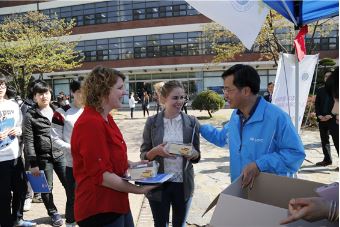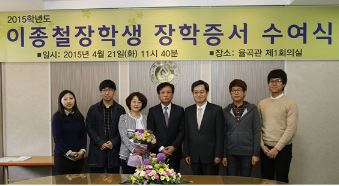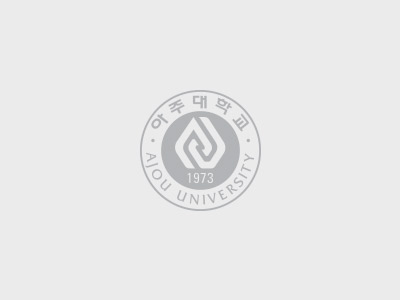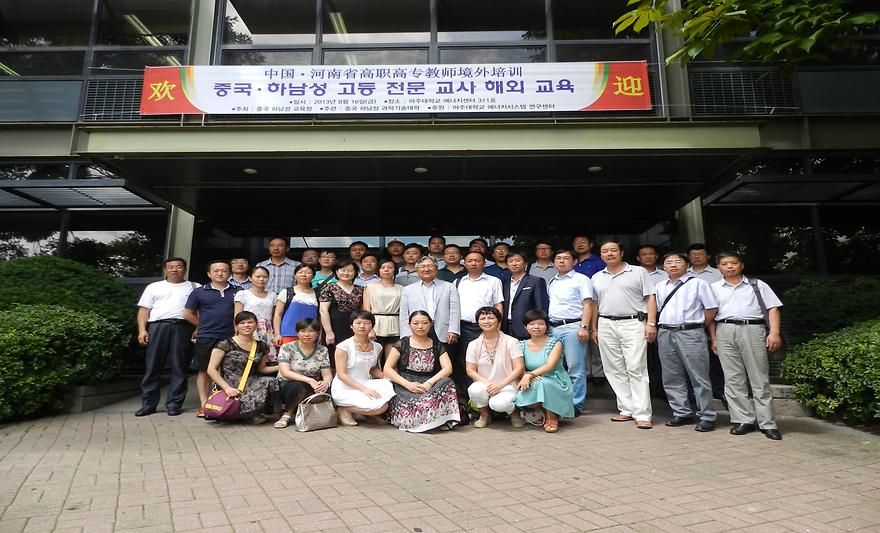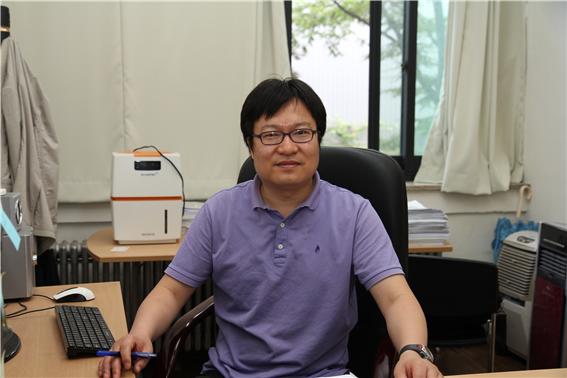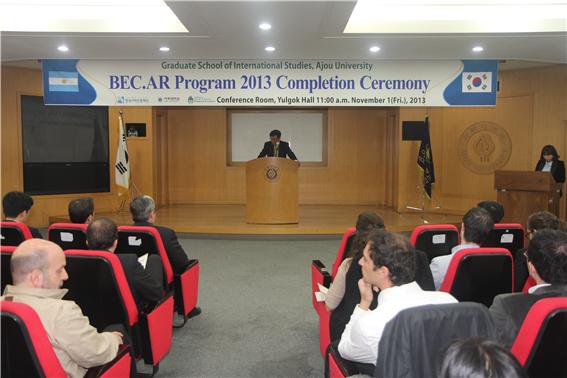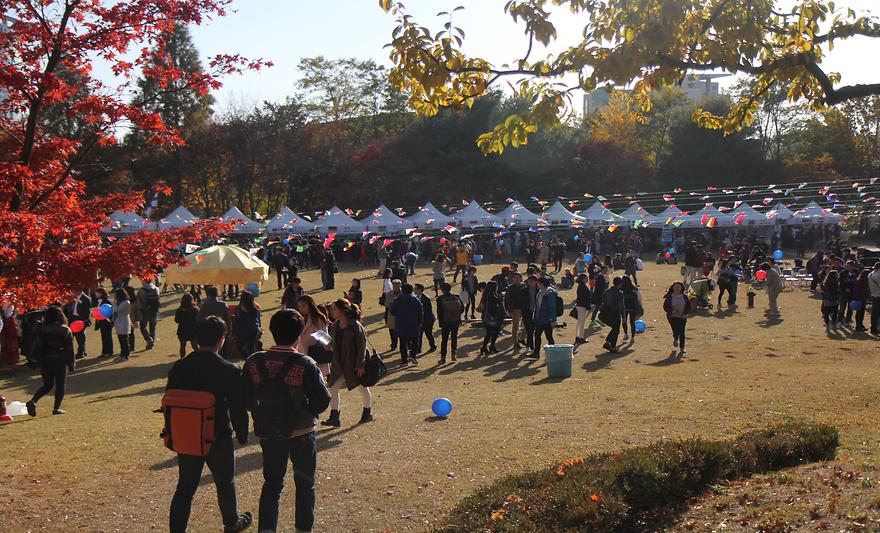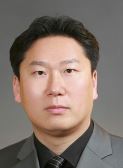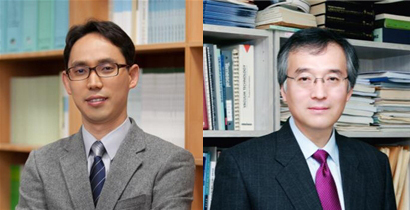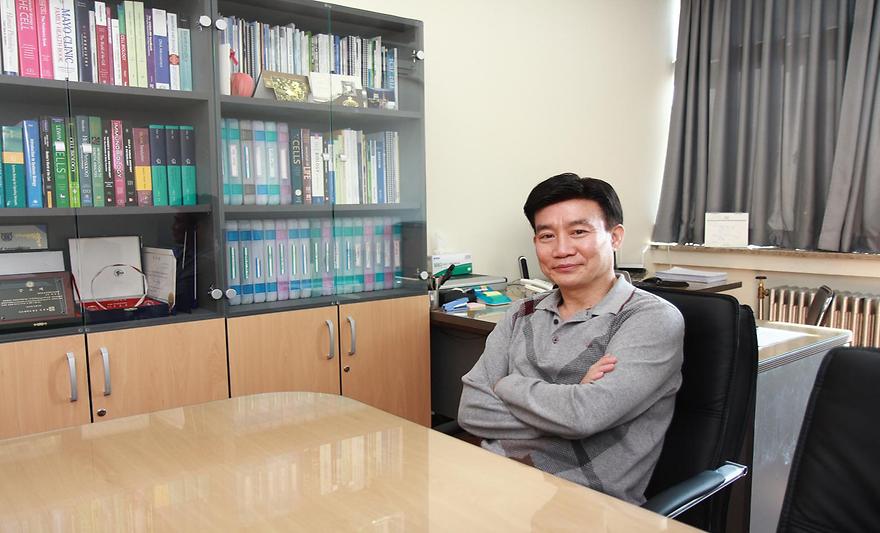-
-
31
- 작성자OIA
- 작성일2015-04-27
- 23292
- 동영상동영상
-
A ceremony was held on April 21st in Conference Room 1 of Yulgok Hall to present the first certificates for the Lee Jong Cheol Scholarship. During the ceremony, CEO Jong Cheol Lee of Dong Seong Metal presented scholarship certificates to four students. Last October, Jong Cheol Lee contributed 100 million won in scholarship funds, and the University decided to grant scholarships of 10 million won per semester in the name of the Lee Jong Cheol Scholarship. The scholarship presentation was the first one under the University’s schedule, and the certificate recipients were two students from the Department of Pharmacy and two students from the Department of Materials Science and Engineering. CEO Lee is a graduate from the 43rd Advanced Management Program under the University’s Graduate School of Business Administration. He has continually made contributions as a director of the Akyung Scholarship Foundation, which was established by the alumni of Ajou’s Graduate School of Business Administration and grants scholarships only to Ajou students. Seong Hwan Kim (Department of Materials Science and Engineering) expressed his appreciation as the representative of the scholarship recipients by saying, “This scholarship allows me to please my parents. It acts as motivation for me to study harder, and I will cherish the wishes of the scholarship contributor.” CEO Lee said, “I make contributions to enrich my mind by sharing what I have, rather than just living an affluent life.” The ceremony was attended by CEO Lee and his wife, President Dong Yeon Kim, Professor Kyung Hyun Ko (Department of Materials Science and Engineering), Professor Hong Pyo Kim (Department of Pharmacy), and Vice President for Student Affairs Jai Hyoung Cho, etc.
-
29
- 작성자OIA
- 작성일2015-04-27
- 23056
- 동영상동영상
-
-
27
- 작성자윤정용
- 작성일2014-08-12
- 35343
- 동영상동영상
-
Ajou holds sixth Korea-China-Japan Engineering Workshop Ajou University recently held the 2013 Engineering Workshop with universities from Korea, China and Japan. The workshop is held annually and saw the participation of Ajou University from Korea, Shandong University from China, and Kumamoto University from Japan; it is aimed at strengthening research networks among the universities. This marks the second time Ajou University has held the workshop after its first hosting in 2010. This sixth workshop was held from Nov. 7 to 9, with around 60 science and engineering experts from the fields of computer engineering, electric engineering, chemical engineering, and biochemical engineering in attendance. Forty-three presentations were given over the course of the three days. Participating in the workshop from Ajou University were Choi Yun-Ho, dean of the College of Engineering, LEE Hyung Chun, dean of the College of Natural Sciences, Kwon Yongjin, vice dean of the College of Engineering, as well as professors Lee Taek Kyun, Kim Kangseok, Jeon Youngmok, Lee Kijung, Jung Jaewon, Kim Moonsuk, Kim Wook, Yoon Hyun C., Shin Gwy-Am, and others. Ajou University also held a research lab experience program for 12 scholarship students from Kumamoto University in Japan. The students visited Ajou University during the workshop period and participated, up to Nov. 13, in research activities in 10 research labs.
-
25
- 작성자OIA
- 작성일2013-12-03
- 33201
- 동영상동영상
-
-
23
- 작성자OIA
- 작성일2013-12-03
- 33715
- 동영상동영상
-
Ajou University signs dual degree program agreement with Namkyung University of Science and Engineering in China Ajou University recently signed a dual degree program agreement with Namkyung University of Science and Engineering in China. President of Ajou University Dr. Jae-hwan Ahn visited Namkyung University of Science and Engineering in China, for four days from Nov. 20, signing the agreement during his visit. Planning Director Min-koo Kim and Head of the International Cooperation Team Jae-eun Kim accompanied the president to China. Under the agreement, the two universities will conduct student exchanges in which students from each institution will be allowed to study in China or Korea toward obtaining a dual degree from each university. Specifically, the dual degree system is one in which a student earns a certain number of credits at Ajou University (at least 1/2 of graduation credits) and the remaining credits from the other university, thereby obtaining degrees from both universities. The International Cooperation Team of Ajou University has made continuous efforts to expand the dual degree program, which has until now focused on sister universities in the United States (Stony Brook University and Illinois Institute of Technology) and in Australia (Sunshine Coast University), to include more universities in Asian countries, including China. Namkyung University of Science and Engineering is located in Namkyung (Nanjing) in Jiangsu; it signed a sister university agreement with Ajou University in 1995. Namkyung University has 12 colleges, including the College of Chemical Engineering, the College of Electric Engineering, and the College of Humanities, and has been recognized for excellence in the area of science and engineering. President Ahn during his visit participated in the celebratory events held to mark the 60th anniversary of the foundation of Namkyung University of Science and Engineering, and met with the Ajou University students currently studying at Namkyung University as exchange students. A total of 10 students are studying as exchange students at Namkyung University of Science and Engineering this year.
-
21
- 작성자OIA
- 작성일2013-12-03
- 33947
- 동영상동영상
-
Professor Joo-min Kim and team ascertain core principle of portable blood analyzerProfessor Joo-min Kim (pictured) of the Energy System/Chemical Engineering Department of Ajou University and his team recently identified the phenomenon of micro particles “lining up” in low a concentrate DNA solution. This research is expected to contribute greatly to the future development of portable blood analyzers. The research was published in the online edition of the international academic journal Nature Communications.The Ministry of Science, ICT and Future Planning announced the finding on Nov. 13, stating that Professor Kim and his team had ascertained a central lineup of particles sized in the several micro meters (1/1 mil of 1 meter) in the flow of a low concentrate DNA solution.This research outcome is expected to facilitate the future development of micro electrochemical impedance biosensors, devices which enable individuals to conduct blood exams at home, eliminating the need to visit hospitals for the procedure. This is because portable blood analyzers require condensation technology for micro particles, such as cells, in order to ensure the accuracy of analysis. Existing blood analysis devices require additional equipment, such as complexly structured channels or electricity generators.Professor Kim said, “Once this research develops further, the commercialization of not only portable blood analyzers but also high-performance cell analyzers can be accelerated.”Kyo-won Kang, a graduate student in the Energy System Department of Ajou University, was first author of the paper.
-
19
- 작성자OIA
- 작성일2013-12-03
- 36999
- 동영상동영상
-
Ajou holds “Argentina BEC.AR” completion ceremonyThe Graduate School of International Studies at Ajou University held, on Nov. 1, the “Argentina BEC.AR” completion ceremony in the Conference Room in Yulgok Hall. BEC.AR is a program that was founded by the Argentine Government in which talented, qualified individuals receive full funding from the Government to study abroad. Twenty-nine individuals from academia, companies, and research institutes in Argentina have been studying at Ajou University since August.The program, sponsored by the Prime Minister’s Office of Argentina, was initiated with the purpose of developing science technology experts. Specifically, the Government of Argentina selected 268 science and technology experts from governmental agencies, companies, and academia and dispatched them to Korea, the United States, France, Italy, and Brazil to advance their skills. The full tuition fees for the 29 students studying at Ajou University were borne by the Government of Argentina.Notably, Ajou University was the only educational institution in Korea to be selected for participation in the project. Prior to the students entering Ajou University, a tripartite agreement was signed between Ajou, the Korea Foundation for the Promotion of Private School, and the Prime Minister’s Office of Argentina, stipulating program operation for the next three years.Participants in the BEC.AR program have the opportunity to take innovation management in business and industry courses; IT, BT and NT courses; and Korean language courses. Students also participated in various field trips throughout the study period, including company visits, and attend special lectures geared to their areas of study. This program is a shortened version of the one-year research curriculum of the graduate school, reduced in duration to 3 months. Each trainee attended a total of 432 hours (27 credits) of classes. The curriculum was developed and headed by Dean of the Graduate School of International Studies Jae-ik Lim and professors from the colleges of engineering, information communications, and business management.One trainee, Hernan Gabriel Curras, aged 29, an IT engineer, shared his impressions of the experience by saying, “The quality and passion of the faculty were very impressive, and in particular, I was delighted to meet in person the corporate CEOs and government officers who led the ‘Miracle of Han River’ during the special lecture series.”He added, “By utilizing the things I have seen, heard, and just generally experienced at Ajou University, I hope I can grow as an IT engineer and a businessman in my home country.”
-
17
- 작성자OIA
- 작성일2013-12-03
- 32315
- 동영상동영상
-
“Ajou International Day” celebrates the university’s culturally diverse student body“Ajou International Day,” held on the lawn square beside the sports stadium on Nov. 7, offered a great opportunity for the foreign students at Ajou University to introduce the cultures and foods of their home countries. Around 600 students from 44 countries participated in this year’s event, running booths that showcased the traditional attire, foods, and others characteristics of their home countries.This year’s program began at 11 am with the opening ceremony followed by a series of events, including a congratulatory performance by the Martial Arts 24th Group BEAT, a tug-of-war, and a talent show. President of Ajou University Dr. Jae-hwan Ahn, vice dean of the College of Medicine Euy-young Soh, dean of the Graduate School Jae-suk Yoo, as well as the deans of various other colleges and departmental heads, all attended the event. Representatives from the embassies of Uzbekistan, Ghana and Vietnam as well as members of Shandong University in China and Ajou’s sister universities in China were present as well.Participants were also given the opportunity to experience traditional Korean folk games like neolttwigi (similar to the see-saw), tuho (throwing sticks into a canister), and jae-ki-cha-hi (kicking shuttlecock game) and try on traditional Korean wedding attire.About the event, President of Ajou University Dr. Jae-hwan Ahn commented, “I hope that Ajou International Day will serve as an opportunity for mutual understanding and exchange between and among local and overseas students.”
-
15
- 작성자OIA
- 작성일2013-12-03
- 31267
- 동영상동영상
-
Professor Kim Dong-wan’s Research Team Develops New Bacteria-Powered Battery The team led by Professor Kim Dong-wan of the Department of Energy Systems in Ajou University has succeeded in synthesizing a nano powder that could be used on the electrodes of supercapacitors located on the surface of bacteria. This development is significant in that the process is relatively simple and effective in synthesizing metal oxide powders capable of being used as high-performance electrode materials that are environmentally-friendly at room temperature. The supercapacitors have a lower energy density than a lithium ion battery but are capable of rapid recharging and discharging a high power density. The supercapacitors represent a next-generation energy storage device that are highly efficient and semi-permanent and can be used as an alternative for subsidiary batteries or battery substitutes. Professor Kim’s discovery was published in the online edition of Scientific Reports, on July 31, under the title, “Scalable One-pot Bacteria-Templating Synthesis Route toward Hierarchical, Porous-Co3O4 Superstructures for Supercapacitor Electrodes.” Synthesizing a nanopowder using high-molecular biomaterials, such as DNA, proteins and viruses, produces unique structures due to their diversity of shapes and properties; moreover, the surface area is large and can be produced at a lower temperature. However, the high price of high-molecular biomaterials, the complexity of the process and lower yield were limitations of this process. The Team led by Professor Kim has synthesized a cobalt oxide nano powder at the gram level on the surface of bacteria. This means large quantities can be gained through easy manipulation. The team increased the yield to the gram level from the previously obtained micro- and milligram levels. The produced cobalt oxide has a large surface area and micro pores and is anticipated to be applied as a material for electrode in devices such as next-generation energy storage devices. The micrococcus is a 0.5-1 micrometer sized round-shaped bacteria surrounded by a thick cell wall composed of various negatively charged functional groups to which metal cations can easily adhere. Therefore, the transition metals, including the cobalt oxides, are used as the material for electrodes due to their high capacitance due to oxidation reduction exchanges compared to the existing active carbon electrodes. The yield was improved due to the high yield of bacterial reproduction, their amenability to genetic modification, and strong absorption of metallic ions to the cell walls. Absorption occurs due to the electrostatic tension between the negatively charged cell walls and positively charged cobalt ions. The powder is also easy to obtain as it can be processed in a solution at room temperature and under normal pressure. The synthesized cobalt oxide powder is expected to contribute to increasing the capacitance and longevity of the supercapacitors. This is because the density of energy storage will increase due to the larger area of contact for ions in the electrolyte due to the micro pores between the powder particles spread evenly on the surface of the bacteria. In addition, the storage efficiency will be maintained at greater than 95% even after 4,000 recharges and discharges. The speed of the charging will also be increased. Professor Kim explained that the outcome of this study is the "process of synthesizing a metal oxide nano powder of various compounds that could be used as a material for the electrodes to be used in next-generation energy storage devices that provide a higher yield." Shim Hyeon-woo, a doctoral candidate in energy systems and the first author of the research paper, mainly led the research project. The co-researchers included Professor Kim Du-heon of the Department of Molecular Science and Technology and his research team, who helped with bacterial cultivation. Images <Diagram of a Bacteria-Templating Route for Synthesizing a Cobalt Oxide> (a) Micrococcus template(b) Cell wall structure including bacteria template functional groups(c) Bacteria template negatively charged due to functional groups(d) Diagram of a bacteria-templating route for synthesizing cobalt oxide
-
13
- 작성자OIA
- 작성일2013-11-11
- 32464
- 동영상동영상
-
-
11
- 작성자OIA
- 작성일2013-11-11
- 31580
- 동영상동영상
-
Professor Choi Sangdun Wins National Academy of Sciences AwardProfessor Choi Sangdun of the Department of Life Sciences at Ajou University has been named the recipient of the 58th National Academy of Sciences (NAS) Award in the basic natural sciences category. Professor Choi received his award and a gift of KRW 50 million at the NAS building in Seocho-gu, Seoul, on September 13.The NAS announced on July 12 its decision to award Professor Choi along with four other professors this year’s NAS awards. Specifically, Professor Lee Yong-il of Seoul National University was the co-winner of the award in the basic natural sciences category along with Professor Choi. Professors Choi Jeong-yeon and Han Jae-yong, both of Seoul National University, were co-winners in the applied natural sciences category, and Dr. Kim Jong-geon, now professor emeritus at Korea University, received the award in the humanities category.The NAS honors scientists and researchers whose scholarly works and publications have made undeniable contributions to the advancement of learning. The award contenders are nominated by major academic societies in Korea or abroad, or by members of the NAS, and the winners are finally selected based on their performances in by-category and general evaluations and reviews, and ratified by the NAS general assembly.The NAS, first established in 1954, supports scholarly research, international academic exchange, and policymaking that encourages learning and academic achievement. The organization has 139 members as of 2013.
-
9
- 작성자OIA
- 작성일2013-11-11
- 31179
- 동영상동영상

